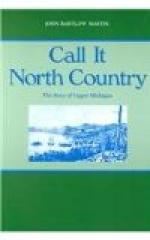THE CALL OF THE NORTH
Being a Dramatized Version of
Conjurors house
A Romance of the Free Forest
BY
Stewart Edward White
Author of the westerners,
the blazed trail,
etc.
THE CALL OF THE NORTH
Chapter One
The girl stood on a bank above a river flowing north. At her back crouched a dozen clean whitewashed buildings. Before her in interminable journey, day after day, league on league into remoteness, stretched the stern Northern wilderness, untrodden save by the trappers, the Indians, and the beasts. Close about the little settlement crept the balsams and spruce, the birch and poplar, behind which lurked vast dreary muskegs, a chaos of bowlder-splits, the forest. The girl had known nothing different for many years. Once a summer the sailing ship from England felt its frozen way through the Hudson Straits, down the Hudson Bay, to drop anchor in the mighty River of the Moose. Once a summer a six-fathom canoe manned by a dozen paddles struggled down the waters of the broken Abitibi. Once a year a little band of red-sashed voyageurs forced their exhausted sledge-dogs across the ice from some unseen wilderness trail. That was all.
Before her eyes the seasons changed, all grim, but one by the very pathos of brevity sad. In the brief luxuriant summer came the Indians to trade their pelts, came the keepers of the winter posts to rest, came the ship from England bringing the articles of use or ornament she had ordered a full year before. Within a short time all were gone, into the wilderness, into the great unknown world. The snow fell; the river and the bay froze. Strange men from the North glided silently to the Factor’s door, bearing the meat and pelts of the seal. Bitter iron cold shackled the northland, the abode of desolation. Armies of caribou drifted by, ghostly under the aurora, moose, lordly and scornful, stalked majestically along the shore; wolves howled invisible, or trotted dog-like in organized packs along the river banks. Day and night the ice artillery thundered. Night and day the fireplaces roared defiance to a frost they could not subdue, while the people of desolation crouched beneath the tyranny of winter.
Then the upheaval of spring with the ice-jams and terrors, the Moose roaring by untamable, the torrents rising, rising foot by foot to the very dooryard of her father’s house. Strange spirits were abroad at night, howling, shrieking, cracking and groaning in voices of ice and flood. Her Indian nurse told her of them all—of Mannabosho, the good; of Nenaubosho the evil—in her lisping Ojibway dialect that sounded like the softer voices of the forest.




